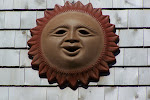But seriously there are some great reasons to consider your seed sources, even if you're just planting a few tomatoes.
Angus Mellish at Vesey's once asked, "Do you what kind of beans people will be planting this year? The same kind they planted last year." His good natured attitude explains that we all find favorites that we plant year after year. Garden heirlooms become popular again when people re-discover varieties that used to be popular.
A great example of this is the return of the brandywine tomato to commercial seed catalogs.

The brandywine was a commercial variety that was listed in seed catalogs in the 1880's. It came back into the garden in the 1990's, thanks in part to Seed Savers Exchange. These humble seeds were planted every season and saved for over 100 years, then passed to the Seed Savers by an elderly gardener. There are now many sources of this heirloom available, which brings me to where we are in our garden this year.
Part of our challenge every year is meeting the requirement to create a seed search document to prove that we have made an effort to find, purchase and plant organic seeds from approved organic sources. This is much easier than it use to be thanks to the internet and an increase in resources in Canada. But as you'll see, whether you're planting a garden or a few acres, buying quality seed is expensive. Buying certified organic seed is even more expensive. And shipping is...well...not cheap.
So now, here's where GMO, patented seeds, heirlooms and sustainability cross. We have to select organic seeds whenever possible. And we're also investing in seed we can plant, harvest and select for planting next year. It's part of our plan to keep our costs down by producing our own seeds on the farm. And we hope it will be our small contribution to creating a stock of seeds that can help feed PEI into the future.
If you're interested in locating and growing certified organics, heritage and open pollinated varieties, you might want to get on the Seed Savers Exchange website and stock up on some varieties to try this summer.
If you find something you like, you can save seeds and save money.









No comments:
Post a Comment